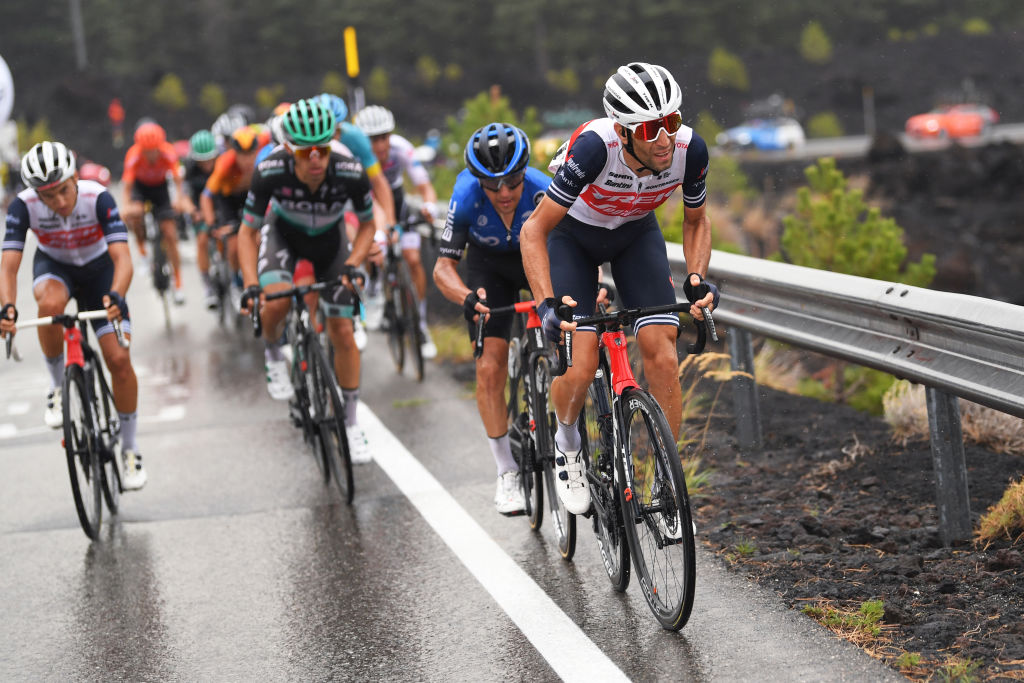Vincenzo Nibali: I'm not surprised Etna did some damage at Giro d'Italia
Italian moves up to sixth overall with assured display on first summit finish

Vincenzo Nibali (Trek-Segafredo) has long proven himself to be the man for the long road at the Giro d’Italia, a rider with the invaluable gift of outlasting his rivals in the dying days of a Grand Tour.
When Nibali conceded over a minute to Geraint Thomas (Ineos) and 40 seconds to Simon Yates (Mitchelton-Scott) in the opening time trial in Palermo, one expected the Sicilian might have to rely on those famous powers of endurance in the third week to recoup his early losses. Instead, he received an unexpected boon on home roads on Mount Etna on Monday, when the British challengers floundered one after the other.
Thomas’ ill-starred relationship with the Giro continued when he crashed heavily in the neutralised zone in Enna, and he would be dropped even before the gruppo hit the slopes of Etna, losing 12 minutes and all hope of overall victory on just the third day of the race. Yates’ crisis was rather more surprising, given that his Mitchelton-Scott squad led the peloton for much of the day, but he was distanced midway up the volcano, conceding 3:31 to a select group of favourites that included Nibali, Jakob Fuglsang (Astana) and Steven Kruijswijk (Jumbo-Visma).
“I got a glimpse of Thomas’ crash, but when he came back to the peloton he stayed in the front positions and, honestly, I didn't expect him to be so bad. The same goes for Yates, albeit for different reasons,” said Nibali, though he conceded that a category 1 climb on the third day of the Giro was always likely to make an impression.
“From experience, I can say that I’m not surprised that a climb as hard as that in first week was able to do some damage. Some riders need to feel their way into a race more than others and if you’re on a bad day, you pay dearly.”
Nibali’s Trek-Segafredo squad were prominent in setting the tempo in the peloton on the approach to Linguaglossa at the foot of Etna and they were encouraged to persist in their efforts when Thomas was jettisoned out the back. As the group of favourites was pared down on the climb itself, Nibali was always prominent towards the front and he helped to whittle down the numbers still further with an acceleration with a little over 3km to race.
When Fuglsang attacked shortly afterwards, Nibali was the first man to respond, and they were joined in turn by Domenico Pozzovivo (NTT), Steven Kruijswijk (Jumbo-Visma) and Rafal Majka (Bora-Hansgrohe). That quintet came home 51 seconds down on stage winner and early escapee Jonathan Caicedo (EF Pro Cycling).
Get The Leadout Newsletter
The latest race content, interviews, features, reviews and expert buying guides, direct to your inbox!
In the overall standings, Nibali lies 6th overall, 55 seconds down on new leader João Almeida (Deceuninck-QuickStep). Just 48 hours after the scirocco wind seemed to buffet his prospects of overall victory, Nibali’s view of the maglia rosa was altogether clearer despite the gloomy low cloud atop Mount Enta.
“Rivals aside, I can look at my own race and be satisfied, but I must also say that you need to keep your feet firmly on the ground,” Nibali said.
“We’re only in the third day of the race. Just as I didn’t lose heart after the time trial, I won’t give in easily to enthusiasm now. It’s banal to say it, but Grand Tours are built day by day. Days like today give me more serenity, but the concentration is very high: I’m really motivated for this Giro.”

Barry Ryan was Head of Features at Cyclingnews. He has covered professional cycling since 2010, reporting from the Tour de France, Giro d’Italia and events from Argentina to Japan. His writing has appeared in The Independent, Procycling and Cycling Plus. He is the author of The Ascent: Sean Kelly, Stephen Roche and the Rise of Irish Cycling’s Golden Generation, published by Gill Books.